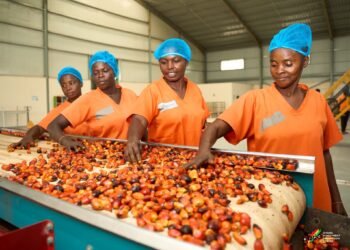The Vegetable Producers and Exporters Association of Ghana (VEPEAG) has renewed calls for the African Continental Free Trade Area (AfCFTA) Secretariat to intensify efforts toward eliminating longstanding trade barriers that continue to frustrate intra-African commerce.
The Association’s plea comes in light of both external and internal pressures, notably the recent imposition of a 10% tariff by the United States government on imported goods from all countries, including Ghana.
Speaking on the impact of these developments, President of VEPEAG, Dr. Felix Mawuli Kamassah, urged the AfCFTA Secretariat to show stronger commitment and urgency in addressing the infrastructural and logistical bottlenecks that inhibit free movement of goods across African borders. According to Dr. Kamassah, such barriers discourage exporters from exploring other African countries as viable markets, thereby undermining the very purpose of AfCFTA.
“Some of these barriers are serious hindrances to traders and drivers. If you speak to people engaged in regional trade, especially within ECOWAS and the broader West African region, they’ll tell you about the numerous challenges they face.”
Dr. Felix Mawuli Kamassah
Common Complaints
Among the common complaints are poor road networks, long customs procedures, multiple checkpoints, and inconsistent border policies across countries. These issues not only increase the cost of doing business but also create uncertainty for exporters seeking to tap into the African market. For instance, Dr. Kamassah cited onion traders who transport goods from Niger, explaining that they often face multiple obstacles during transit, including extortion and bureaucratic delays.
“It shouldn’t be like that. We want to promote trade among ourselves. Why can’t we make better decisions and identify key areas to improve?” he questioned. His remarks underscore a broader frustration among African traders, who feel that despite the political will behind AfCFTA, practical efforts to eliminate non-tariff barriers remain inadequate.
Launched in 2021, the AfCFTA agreement was heralded as a transformative project for the continent, aiming to create the largest single market in the world, with over 1.3 billion people across 54 countries. The agreement promises to reduce tariffs, streamline customs procedures, and foster a competitive industrial base for Africa’s development. Yet, nearly four years on, many exporters believe the pace of implementation has been too slow, and the benefits remain elusive.
Handouts Or Subsidies
VEPEAG’s call is therefore not about requesting handouts or subsidies, but about enabling an environment that allows African businesses to thrive. Dr. Kamassah was clear on this point, stressing that exporters are not asking for financial assistance from governments or regional bodies, but for practical solutions to remove the hurdles that stand in their way.
“What we need is an efficient system that supports intra-African trade. We don’t need aid; we need action. Infrastructure must improve, logistics must be simplified, and border crossing processes must be harmonized.”
Dr. Felix Mawuli Kamassah
The Association’s concerns come at a critical moment. With global markets becoming more unpredictable and protectionist—exemplified by the U.S. tariff hikes—African countries have a golden opportunity to deepen economic integration and reduce dependence on foreign markets. By fostering intra-African trade, countries can retain value within the continent, generate employment, and build more resilient economies.
VEPEAG also sees the AfCFTA as a tool to encourage agricultural transformation. Africa is home to over 60% of the world’s uncultivated arable land, and with the right investment and policy support, it could feed itself and export surplus to regional markets. For vegetable producers in Ghana and elsewhere, easier access to neighboring markets could unlock new growth opportunities and reduce post-harvest losses.
In light of these prospects, VEPEAG is calling on the AfCFTA Secretariat to urgently convene a stakeholder dialogue involving exporters, transport operators, border officials, and policymakers to map out a concrete action plan. Dr. Kamassah believes that only through collaboration and accountability can the full potential of AfCFTA be realized. “Let us work together to remove these avoidable barriers. AfCFTA should not just be a document—it should be a reality in our daily trade,” he concluded.
READ ALSO: CalBank Slips by 2.78% Despite Doubling Share Value Since January























